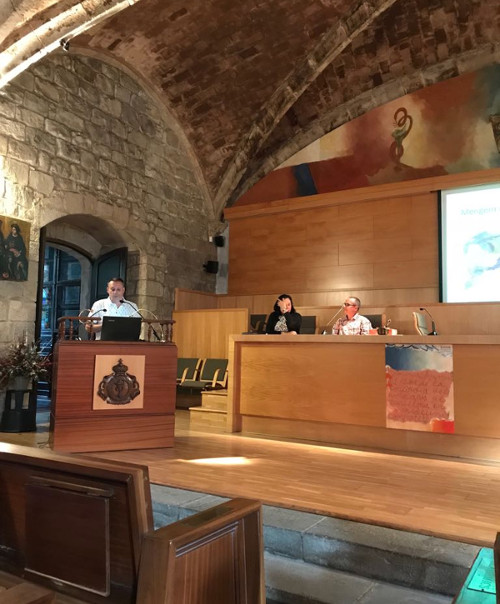 Maria Àngels Calvo, full academician and president of the Section of Health Sciences of the Royal European Academy of Doctors-Barcelona 1914 (RAED), participated on June 27 in the academic session on heliculture organized by the Royal Academy of Pharmacy of Catalonia, of which she is also academician. Calvo intervened with the paper “Aspectos sanitarios y fases productivas. Actualidad y futuro” (“Health aspects and productive phases. Current and future”), in which she explained the work carried out jointly by the Spanish National Association for the Breeding and Fattening of the Snail and the Research Group in Applied and Environmental Microbiology of the Autonomous University of Barcelona, directed by the academician herself.
Maria Àngels Calvo, full academician and president of the Section of Health Sciences of the Royal European Academy of Doctors-Barcelona 1914 (RAED), participated on June 27 in the academic session on heliculture organized by the Royal Academy of Pharmacy of Catalonia, of which she is also academician. Calvo intervened with the paper “Aspectos sanitarios y fases productivas. Actualidad y futuro” (“Health aspects and productive phases. Current and future”), in which she explained the work carried out jointly by the Spanish National Association for the Breeding and Fattening of the Snail and the Research Group in Applied and Environmental Microbiology of the Autonomous University of Barcelona, directed by the academician herself.
Heliculture is defined as breeding a complete biological cycle of snails. The terrestrial snail Helix Aspersa Müller is the most widely used in different European regions as food, as it stands out for its high prolificacy and ability to adapt to the environment. But snail farming is a livestock activity and is not exempt from the manifestation of pathological processes of microbiological origin that cause productive losses. Currently, this type of livestock has the objective of marketing a quality snail, subject to rigorous sanitary and zootechnical controls to ensure its safety and safety as a food.
The main objective of the research led by Calvo is to optimize and generate methodologies that facilitate the correct administration of the probiotic strain Lactobacillus Plantarum, isolated from faeces of healthy snails, and that contributes to improving the sanitary status of farms intended for snail farming and fattening land. The results obtained, presented by the academician, show that the contamination detected in the ship destined for the reproduction of snails is related to the microorganisms existing in the gut microbiota of animals, mainly those of the family Enterobacteriaceae.
In the laboratory, after administration to snails of different age of feed enriched with this Lactobacillus, the results allow to affirm that it modifies the microbiota of the snail, prevents its mortality, increases the number of laying and improves the microbiological quality of the feed. Based on these results, an improvement of the health status of the snails is determined thanks to the prevention of pathologies of microbial origin and modification of the intestinal microbiota. “All this” -said Calvo- “leads to a productive improvement during the snail’s aging and adds value to the final product, with consequent positive impact on its commercialization”.




